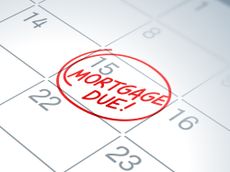New support for struggling mortgage borrowers - but there's a cost
Around 356,000 borrowers may be at risk of missing monthly payments by summer 2024. We explain what help will now be available - and the impact it can have on your credit score

Homeowners struggling to meet their rising mortgage repayments will be able to get help after the watchdog urged lenders to be lenient to those facing financial hardship.
Around 356,000 mortgage borrowers could face payment difficulties by the end of June 2024, according to the Financial Conduct Authority (FCA).
The monthly cost of a new mortgage rose by 61% in the year to December 2022 for the average semi-detached house in the UK, according to recent data by the Office for National Statistics (ONS).
While mortgage rates have come down in recent months following the shock impact of the mini-Budget last September which led to rates rising, they are still at high levels not experienced since the 2008 financial crisis.
And now the FCA has revealed new guidance for lenders with customers that cannot keep up with mortgage payments due to rising interest rates.
It expects lenders to help support borrowers who have missed payments or are worried they may not be able to make payments in future.
What are my options if I’m struggling to pay my mortgage?
Under FCA guidance, your lender must consider a range of support options, including:
Look After My Bills Newsletter
Get the best money-saving tips, tricks and deals sent straight to your inbox every week. Make sense of your money in partnership with The Money Edit.
- part-payment plans
- mortgage term extensions
- temporarily transferring to an interest-only mortgage
- deferring interest due
Now under the new guidance, homeowners will be able to also access forbearance options.
This is a temporary agreement where the mortgage lender allows the borrower to temporarily reduce or pause their payments. Borrowers will be able to access forbearance if they are suffering financial hardship, illness, or other circumstances that stops them from being able to make their regular loan payments.
For example, a lender could reduce a homeowner’s monthly payments by putting them on an interest-only mortgage for a set period.
Myron Jobson, senior personal finance analyst at interactive investor, said the new guidance from the regulator means homeowners struggling to meet payment obligations can rest assured that “their lender won’t come down on them like a ton of bricks”.
“Leniency is the name of the game for lenders – as it was during the height of the pandemic,” he said.
Jobson said while mortgage forbearance reduces or suspends mortgage payment for a specific period, borrowers would ultimately need to repay any payment that was suspended, or late during that time.
The impact of forbearance on your credit score
Borrowers should be aware that forbearance could have long-term impacts on their credit scores and the amount they will end up paying on their loan.
Charlotte Nixon, mortgage expert at Quilter said homeowners should carefully think about the risks of forbearance before agreeing to it: “Make sure to fully understand the terms and implications of any forbearance arrangement before agreeing to it and if unsure talk to a mortgage adviser as they can fully assess your needs and review your wider options.”
Those on universal credit may be able to claim help on their mortgage interest payments through the Support for Mortgage Interest scheme. This is a loan which must be repaid when you die, sell your home, or transfer ownership of the property.
Those struggling to meet their mortgage repayment obligations due to the rising cost of living and other financial difficulties should speak to their lender to discuss their situation and what their options are.
“The lender may be able to offer you a variety of options to help you manage any payment shortfalls that may arise,” said Nixon.
“There are a number of options for struggling homeowners – the key is to not suffer in silence,” said Jobson.
He added it is worth consulting a debt advice charity such as StepChange or Turn2Us which will go through all your options.
More on mortgages
-
 Three energy firms pay £8m in switching compensation - has your provider paid out?
Three energy firms pay £8m in switching compensation - has your provider paid out?More than 100,000 customers have received compensation after changing providers, but is now a good time to switch energy suppliers?
By Tom Higgins Published
-
 Save £300 on your supermarket shop with cashback accounts
Save £300 on your supermarket shop with cashback accountsBanks, credit card companies and cashback sites are all offering cashback on your supermarket shop, but can you use them all to max out your savings?
By Vaishali Varu Published
-
 Moving home: why failing to share your new address could cost you money
Moving home: why failing to share your new address could cost you moneyWhen you move home you’ll want to share your new address with family and friends – but being slow to update your contact details with councils, banks and the DVLA can be costly
By Sue Hayward Published
-
 Skipton Building Society to offer deposit-free mortgages for “trapped renters” - everything you need to know about 100% deals
Skipton Building Society to offer deposit-free mortgages for “trapped renters” - everything you need to know about 100% dealsEverything you need to know about how to get a mortgage with no deposit
By Katie Binns Published
-
 Stamp duty: are you entitled to a tax refund worth thousands?
Stamp duty: are you entitled to a tax refund worth thousands?There are plenty of reasons why homebuyers may be entitled to a stamp duty refund, but it’s important to only claim if you’re eligible for a refund (and beware the claims management companies)
By John Fitzsimons Published
-
 House price hotspots: 50 areas where property prices have shot up the most
House price hotspots: 50 areas where property prices have shot up the mostWhich areas have seen the strongest house price growth over the past decade? Discover the towns and locations around the UK where property prices have more than doubled.
By John Fitzsimons Published
-
 Faster mortgage support for Universal Credit claimants – what it means for you
Faster mortgage support for Universal Credit claimants – what it means for youIf you claim Universal Credit, you can now get quicker support with paying your mortgage. We look at when you can get it and how to access it
By Stephanie Baxter Published
-
 Should I fix my mortgage rate?
Should I fix my mortgage rate?Interest rates are expected to rise again on the back of stubborn inflation, before falling next year. We look at the pros and cons of fixing your mortgage rate and what to consider if you need to remortgage soon.
By Stephanie Baxter Last updated
-
 Selling your home: avoid these mistakes to get the best possible price
Selling your home: avoid these mistakes to get the best possible priceFrom boosting kerb appeal to clearing clutter, there are crucial steps to take to ensure you get the highest price when selling your home
By John Fitzsimons Last updated
-
 Interest rates rise to 4.25% - what does it mean for your money?
Interest rates rise to 4.25% - what does it mean for your money?The Bank of England has increased the base rate for the 11th time in a row. We look at whether rates could rise further this year, and what the latest hike means for your mortgage and savings
By Ruth Emery Published